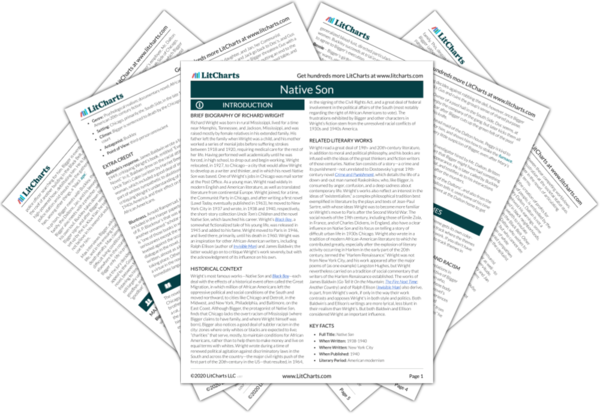Welcome to the LitCharts study guide on Richard Wright's Native Son. Created by the original team behind SparkNotes, LitCharts are the world's best literature guides.
Native Son: Introduction
Native Son: Plot Summary
Native Son: Detailed Summary & Analysis
Native Son: Themes
Native Son: Quotes
Native Son: Characters
Native Son: Symbols
Native Son: Literary Devices
Native Son: Theme Wheel
Brief Biography of Richard Wright

Historical Context of Native Son
Other Books Related to Native Son
Key Facts about Native Son
- Full Title: Native Son
- When Written: 1938-1940
- Where Written: New York City
- When Published: 1940
- Literary Period: American modernism
- Genre: Psychological realism; documentary novel; African-American 20th-century fiction
- Setting: Chicago, primarily the South Side, in the late 1930s
- Climax: Bigger is sentenced to death by the Chicago criminal court
- Antagonist: Buckley
- Point of View: third-person omniscient
Extra Credit for Native Son
Baldwin’s response. James Baldwin wrote a famous essay, in 1949, critiquing Wright’s book, entitled “Everybody’s Protest Novel.” In it, Baldwin drew on the racial attitudes implicit in Uncle Tom’s Cabin (written by Harriet Beecher Stowe, a white woman, which included a good deal of implicit racism on the part of whites sympathetic to abolitionism) as a means of critiquing Wright’s understanding of political conditions in 1940s America, and their effect on the attitudes of young African Americans.
Bluntness. Arnold Rampersad, in his introduction to Native Son included in the Harper paperback edition, refers to a quotation of R. P. Blackmur’s that was applied, as Rampersad notes, by another unnamed “scholar-critic,” to Native Son: namely, that it is “one of those books in which everything is undertaken with seriousness except the writing.” This complaint is sometimes leveled against the occasional woodenness of description and dialogue in the novel, and a sense that the novel was speedily written, almost as a kind of reportage of the events as they are taking place. Other critics, however, argue that this bluntness is a virtue in the novel—an attempt to capture, in “real” and immediate language, the events of Bigger’s life as they unfold.







